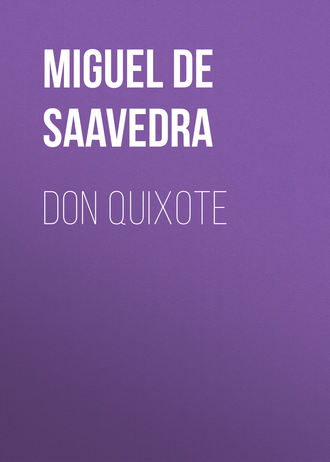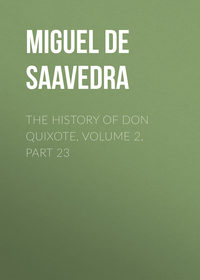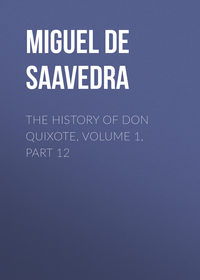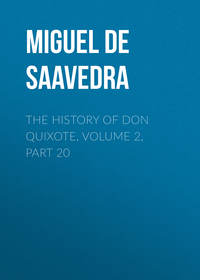 полная версия
полная версияDon Quixote
"I do not understand what retentio means," said Don Quixote.
"Retentio," answered Sancho, "means that whoever is in hell never comes nor can come out of it, which will be the opposite case with your worship or my legs will be idle, that is if I have spurs to enliven Rocinante: let me once get to El Toboso and into the presence of my lady Dulcinea, and I will tell her such things of the follies and madnesses (for it is all one) that your worship has done and is still doing, that I will manage to make her softer than a glove though I find her harder than a cork tree; and with her sweet and honeyed answer I will come back through the air like a witch, and take your worship out of this purgatory that seems to be hell but is not, as there is hope of getting out of it; which, as I have said, those in hell have not, and I believe your worship will not say anything to the contrary."
"That is true," said he of the Rueful Countenance, "but how shall we manage to write the letter?"
"And the ass-colt order too," added Sancho.
"All shall be included," said Don Quixote; "and as there is no paper, it would be well done to write it on the leaves of trees, as the ancients did, or on tablets of wax; though that would be as hard to find just now as paper. But it has just occurred to me how it may be conveniently and even more than conveniently written, and that is in the note-book that belonged to Cardenio, and thou wilt take care to have it copied on paper, in a good hand, at the first village thou comest to where there is a schoolmaster, or if not, any sacristan will copy it; but see thou give it not to any notary to copy, for they write a law hand that Satan could not make out."
"But what is to be done about the signature?" said Sancho.
"The letters of Amadis were never signed," said Don Quixote.
"That is all very well," said Sancho, "but the order must needs be signed, and if it is copied they will say the signature is false, and I shall be left without ass-colts."
"The order shall go signed in the same book," said Don Quixote, "and on seeing it my niece will make no difficulty about obeying it; as to the loveletter thou canst put by way of signature, 'Yours till death, the Knight of the Rueful Countenance.' And it will be no great matter if it is in some other person's hand, for as well as I recollect Dulcinea can neither read nor write, nor in the whole course of her life has she seen handwriting or letter of mine, for my love and hers have been always platonic, not going beyond a modest look, and even that so seldom that I can safely swear I have not seen her four times in all these twelve years I have been loving her more than the light of these eyes that the earth will one day devour; and perhaps even of those four times she has not once perceived that I was looking at her: such is the retirement and seclusion in which her father Lorenzo Corchuelo and her mother Aldonza Nogales have brought her up."
"So, so!" said Sancho; "Lorenzo Corchuelo's daughter is the lady Dulcinea del Toboso, otherwise called Aldonza Lorenzo?"
"She it is," said Don Quixote, "and she it is that is worthy to be lady of the whole universe."
"I know her well," said Sancho, "and let me tell you she can fling a crowbar as well as the lustiest lad in all the town. Giver of all good! but she is a brave lass, and a right and stout one, and fit to be helpmate to any knight-errant that is or is to be, who may make her his lady: the whoreson wench, what sting she has and what a voice! I can tell you one day she posted herself on the top of the belfry of the village to call some labourers of theirs that were in a ploughed field of her father's, and though they were better than half a league off they heard her as well as if they were at the foot of the tower; and the best of her is that she is not a bit prudish, for she has plenty of affability, and jokes with everybody, and has a grin and a jest for everything. So, Sir Knight of the Rueful Countenance, I say you not only may and ought to do mad freaks for her sake, but you have a good right to give way to despair and hang yourself; and no one who knows of it but will say you did well, though the devil should take you; and I wish I were on my road already, simply to see her, for it is many a day since I saw her, and she must be altered by this time, for going about the fields always, and the sun and the air spoil women's looks greatly. But I must own the truth to your worship, Senor Don Quixote; until now I have been under a great mistake, for I believed truly and honestly that the lady Dulcinea must be some princess your worship was in love with, or some person great enough to deserve the rich presents you have sent her, such as the Biscayan and the galley slaves, and many more no doubt, for your worship must have won many victories in the time when I was not yet your squire. But all things considered, what good can it do the lady Aldonza Lorenzo, I mean the lady Dulcinea del Toboso, to have the vanquished your worship sends or will send coming to her and going down on their knees before her? Because may be when they came she'd be hackling flax or threshing on the threshing floor, and they'd be ashamed to see her, and she'd laugh, or resent the present."
"I have before now told thee many times, Sancho," said Don Quixote, "that thou art a mighty great chatterer, and that with a blunt wit thou art always striving at sharpness; but to show thee what a fool thou art and how rational I am, I would have thee listen to a short story. Thou must know that a certain widow, fair, young, independent, and rich, and above all free and easy, fell in love with a sturdy strapping young lay-brother; his superior came to know of it, and one day said to the worthy widow by way of brotherly remonstrance, 'I am surprised, senora, and not without good reason, that a woman of such high standing, so fair, and so rich as you are, should have fallen in love with such a mean, low, stupid fellow as So-and-so, when in this house there are so many masters, graduates, and divinity students from among whom you might choose as if they were a lot of pears, saying this one I'll take, that I won't take;' but she replied to him with great sprightliness and candour, 'My dear sir, you are very much mistaken, and your ideas are very old-fashioned, if you think that I have made a bad choice in So-and-so, fool as he seems; because for all I want with him he knows as much and more philosophy than Aristotle.' In the same way, Sancho, for all I want with Dulcinea del Toboso she is just as good as the most exalted princess on earth. It is not to be supposed that all those poets who sang the praises of ladies under the fancy names they give them, had any such mistresses. Thinkest thou that the Amarillises, the Phillises, the Sylvias, the Dianas, the Galateas, the Filidas, and all the rest of them, that the books, the ballads, the barber's shops, the theatres are full of, were really and truly ladies of flesh and blood, and mistresses of those that glorify and have glorified them? Nothing of the kind; they only invent them for the most part to furnish a subject for their verses, and that they may pass for lovers, or for men valiant enough to be so; and so it suffices me to think and believe that the good Aldonza Lorenzo is fair and virtuous; and as to her pedigree it is very little matter, for no one will examine into it for the purpose of conferring any order upon her, and I, for my part, reckon her the most exalted princess in the world. For thou shouldst know, Sancho, if thou dost not know, that two things alone beyond all others are incentives to love, and these are great beauty and a good name, and these two things are to be found in Dulcinea in the highest degree, for in beauty no one equals her and in good name few approach her; and to put the whole thing in a nutshell, I persuade myself that all I say is as I say, neither more nor less, and I picture her in my imagination as I would have her to be, as well in beauty as in condition; Helen approaches her not nor does Lucretia come up to her, nor any other of the famous women of times past, Greek, Barbarian, or Latin; and let each say what he will, for if in this I am taken to task by the ignorant, I shall not be censured by the critical."
"I say that your worship is entirely right," said Sancho, "and that I am an ass. But I know not how the name of ass came into my mouth, for a rope is not to be mentioned in the house of him who has been hanged; but now for the letter, and then, God be with you, I am off."
Don Quixote took out the note-book, and, retiring to one side, very deliberately began to write the letter, and when he had finished it he called to Sancho, saying he wished to read it to him, so that he might commit it to memory, in case of losing it on the road; for with evil fortune like his anything might be apprehended. To which Sancho replied, "Write it two or three times there in the book and give it to me, and I will carry it very carefully, because to expect me to keep it in my memory is all nonsense, for I have such a bad one that I often forget my own name; but for all that repeat it to me, as I shall like to hear it, for surely it will run as if it was in print."
"Listen," said Don Quixote, "this is what it says:
"DON QUIXOTE'S LETTER TO DULCINEA DEL TOBOSO"Sovereign and exalted Lady, – The pierced by the point of absence, the wounded to the heart's core, sends thee, sweetest Dulcinea del Toboso, the health that he himself enjoys not. If thy beauty despises me, if thy worth is not for me, if thy scorn is my affliction, though I be sufficiently long-suffering, hardly shall I endure this anxiety, which, besides being oppressive, is protracted. My good squire Sancho will relate to thee in full, fair ingrate, dear enemy, the condition to which I am reduced on thy account: if it be thy pleasure to give me relief, I am thine; if not, do as may be pleasing to thee; for by ending my life I shall satisfy thy cruelty and my desire.
"Thine till death,
"The Knight of the Rueful Countenance."
"By the life of my father," said Sancho, when he heard the letter, "it is the loftiest thing I ever heard. Body of me! how your worship says everything as you like in it! And how well you fit in 'The Knight of the Rueful Countenance' into the signature. I declare your worship is indeed the very devil, and there is nothing you don't know."
"Everything is needed for the calling I follow," said Don Quixote.
"Now then," said Sancho, "let your worship put the order for the three ass-colts on the other side, and sign it very plainly, that they may recognise it at first sight."
"With all my heart," said Don Quixote, and as he had written it he read it to this effect:
"Mistress Niece, – By this first of ass-colts please pay to Sancho Panza, my squire, three of the five I left at home in your charge: said three ass-colts to be paid and delivered for the same number received here in hand, which upon this and upon his receipt shall be duly paid. Done in the heart of the Sierra Morena, the twenty-seventh of August of this present year."
"That will do," said Sancho; "now let your worship sign it."
"There is no need to sign it," said Don Quixote, "but merely to put my flourish, which is the same as a signature, and enough for three asses, or even three hundred."
"I can trust your worship," returned Sancho; "let me go and saddle Rocinante, and be ready to give me your blessing, for I mean to go at once without seeing the fooleries your worship is going to do; I'll say I saw you do so many that she will not want any more."
"At any rate, Sancho," said Don Quixote, "I should like – and there is reason for it – I should like thee, I say, to see me stripped to the skin and performing a dozen or two of insanities, which I can get done in less than half an hour; for having seen them with thine own eyes, thou canst then safely swear to the rest that thou wouldst add; and I promise thee thou wilt not tell of as many as I mean to perform."
"For the love of God, master mine," said Sancho, "let me not see your worship stripped, for it will sorely grieve me, and I shall not be able to keep from tears, and my head aches so with all I shed last night for Dapple, that I am not fit to begin any fresh weeping; but if it is your worship's pleasure that I should see some insanities, do them in your clothes, short ones, and such as come readiest to hand; for I myself want nothing of the sort, and, as I have said, it will be a saving of time for my return, which will be with the news your worship desires and deserves. If not, let the lady Dulcinea look to it; if she does not answer reasonably, I swear as solemnly as I can that I will fetch a fair answer out of her stomach with kicks and cuffs; for why should it be borne that a knight-errant as famous as your worship should go mad without rhyme or reason for a – ? Her ladyship had best not drive me to say it, for by God I will speak out and let off everything cheap, even if it doesn't sell: I am pretty good at that! she little knows me; faith, if she knew me she'd be in awe of me."
"In faith, Sancho," said Don Quixote, "to all appearance thou art no sounder in thy wits than I."
"I am not so mad," answered Sancho, "but I am more peppery; but apart from all this, what has your worship to eat until I come back? Will you sally out on the road like Cardenio to force it from the shepherds?"
"Let not that anxiety trouble thee," replied Don Quixote, "for even if I had it I should not eat anything but the herbs and the fruits which this meadow and these trees may yield me; the beauty of this business of mine lies in not eating, and in performing other mortifications."
"Do you know what I am afraid of?" said Sancho upon this; "that I shall not be able to find my way back to this spot where I am leaving you, it is such an out-of-the-way place."
"Observe the landmarks well," said Don Quixote, "for I will try not to go far from this neighbourhood, and I will even take care to mount the highest of these rocks to see if I can discover thee returning; however, not to miss me and lose thyself, the best plan will be to cut some branches of the broom that is so abundant about here, and as thou goest to lay them at intervals until thou hast come out upon the plain; these will serve thee, after the fashion of the clue in the labyrinth of Theseus, as marks and signs for finding me on thy return."
"So I will," said Sancho Panza, and having cut some, he asked his master's blessing, and not without many tears on both sides, took his leave of him, and mounting Rocinante, of whom Don Quixote charged him earnestly to have as much care as of his own person, he set out for the plain, strewing at intervals the branches of broom as his master had recommended him; and so he went his way, though Don Quixote still entreated him to see him do were it only a couple of mad acts. He had not gone a hundred paces, however, when he returned and said:
"I must say, senor, your worship said quite right, that in order to be able to swear without a weight on my conscience that I had seen you do mad things, it would be well for me to see if it were only one; though in your worship's remaining here I have seen a very great one."
"Did I not tell thee so?" said Don Quixote. "Wait, Sancho, and I will do them in the saying of a credo," and pulling off his breeches in all haste he stripped himself to his skin and his shirt, and then, without more ado, he cut a couple of gambados in the air, and a couple of somersaults, heels over head, making such a display that, not to see it a second time, Sancho wheeled Rocinante round, and felt easy, and satisfied in his mind that he could swear he had left his master mad; and so we will leave him to follow his road until his return, which was a quick one.
CHAPTER XXVI.
IN WHICH ARE CONTINUED THE REFINEMENTS WHEREWITH DON QUIXOTE PLAYED THE PART OF A LOVER IN THE SIERRA MORENA
Returning to the proceedings of him of the Rueful Countenance when he found himself alone, the history says that when Don Quixote had completed the performance of the somersaults or capers, naked from the waist down and clothed from the waist up, and saw that Sancho had gone off without waiting to see any more crazy feats, he climbed up to the top of a high rock, and there set himself to consider what he had several times before considered without ever coming to any conclusion on the point, namely whether it would be better and more to his purpose to imitate the outrageous madness of Roland, or the melancholy madness of Amadis; and communing with himself he said:
"What wonder is it if Roland was so good a knight and so valiant as everyone says he was, when, after all, he was enchanted, and nobody could kill him save by thrusting a corking pin into the sole of his foot, and he always wore shoes with seven iron soles? Though cunning devices did not avail him against Bernardo del Carpio, who knew all about them, and strangled him in his arms at Roncesvalles. But putting the question of his valour aside, let us come to his losing his wits, for certain it is that he did lose them in consequence of the proofs he discovered at the fountain, and the intelligence the shepherd gave him of Angelica having slept more than two siestas with Medoro, a little curly-headed Moor, and page to Agramante. If he was persuaded that this was true, and that his lady had wronged him, it is no wonder that he should have gone mad; but I, how am I to imitate him in his madness, unless I can imitate him in the cause of it? For my Dulcinea, I will venture to swear, never saw a Moor in her life, as he is, in his proper costume, and she is this day as the mother that bore her, and I should plainly be doing her a wrong if, fancying anything else, I were to go mad with the same kind of madness as Roland the Furious. On the other hand, I see that Amadis of Gaul, without losing his senses and without doing anything mad, acquired as a lover as much fame as the most famous; for, according to his history, on finding himself rejected by his lady Oriana, who had ordered him not to appear in her presence until it should be her pleasure, all he did was to retire to the Pena Pobre in company with a hermit, and there he took his fill of weeping until Heaven sent him relief in the midst of his great grief and need. And if this be true, as it is, why should I now take the trouble to strip stark naked, or do mischief to these trees which have done me no harm, or why am I to disturb the clear waters of these brooks which will give me to drink whenever I have a mind? Long live the memory of Amadis and let him be imitated so far as is possible by Don Quixote of La Mancha, of whom it will be said, as was said of the other, that if he did not achieve great things, he died in attempting them; and if I am not repulsed or rejected by my Dulcinea, it is enough for me, as I have said, to be absent from her. And so, now to business; come to my memory ye deeds of Amadis, and show me how I am to begin to imitate you. I know already that what he chiefly did was to pray and commend himself to God; but what am I to do for a rosary, for I have not got one?"
And then it occurred to him how he might make one, and that was by tearing a great strip off the tail of his shirt which hung down, and making eleven knots on it, one bigger than the rest, and this served him for a rosary all the time he was there, during which he repeated countless ave-marias. But what distressed him greatly was not having another hermit there to confess him and receive consolation from; and so he solaced himself with pacing up and down the little meadow, and writing and carving on the bark of the trees and on the fine sand a multitude of verses all in harmony with his sadness, and some in praise of Dulcinea; but, when he was found there afterwards, the only ones completely legible that could be discovered were those that follow here:
Ye on the mountain side that grow, Ye green things all, trees, shrubs, and bushes,Are ye aweary of the woe That this poor aching bosom crushes?If it disturb you, and I owe Some reparation, it may be aDefence for me to let you knowDon Quixote's tears are on the flow, And all for distant Dulcinea Del Toboso.The lealest lover time can show, Doomed for a lady-love to languish,Among these solitudes doth go, A prey to every kind of anguish.Why Love should like a spiteful foe Thus use him, he hath no idea,But hogsheads full – this doth he know —Don Quixote's tears are on the flow, And all for distant Dulcinea Del Toboso.Adventure-seeking doth he go Up rugged heights, down rocky valleys,But hill or dale, or high or low, Mishap attendeth all his sallies:Love still pursues him to and fro, And plies his cruel scourge – ah me! aRelentless fate, an endless woe;Don Quixote's tears are on the flow, And all for distant Dulcinea Del Toboso.The addition of "Del Toboso" to Dulcinea's name gave rise to no little laughter among those who found the above lines, for they suspected Don Quixote must have fancied that unless he added "del Toboso" when he introduced the name of Dulcinea the verse would be unintelligible; which was indeed the fact, as he himself afterwards admitted. He wrote many more, but, as has been said, these three verses were all that could be plainly and perfectly deciphered. In this way, and in sighing and calling on the fauns and satyrs of the woods and the nymphs of the streams, and Echo, moist and mournful, to answer, console, and hear him, as well as in looking for herbs to sustain him, he passed his time until Sancho's return; and had that been delayed three weeks, as it was three days, the Knight of the Rueful Countenance would have worn such an altered countenance that the mother that bore him would not have known him: and here it will be well to leave him, wrapped up in sighs and verses, to relate how Sancho Panza fared on his mission.
As for him, coming out upon the high road, he made for El Toboso, and the next day reached the inn where the mishap of the blanket had befallen him. As soon as he recognised it he felt as if he were once more living through the air, and he could not bring himself to enter it though it was an hour when he might well have done so, for it was dinner-time, and he longed to taste something hot as it had been all cold fare with him for many days past. This craving drove him to draw near to the inn, still undecided whether to go in or not, and as he was hesitating there came out two persons who at once recognised him, and said one to the other:
"Senor licentiate, is not he on the horse there Sancho Panza who, our adventurer's housekeeper told us, went off with her master as esquire?"
"So it is," said the licentiate, "and that is our friend Don Quixote's horse;" and if they knew him so well it was because they were the curate and the barber of his own village, the same who had carried out the scrutiny and sentence upon the books; and as soon as they recognised Sancho Panza and Rocinante, being anxious to hear of Don Quixote, they approached, and calling him by his name the curate said, "Friend Sancho Panza, where is your master?"
Sancho recognised them at once, and determined to keep secret the place and circumstances where and under which he had left his master, so he replied that his master was engaged in a certain quarter on a certain matter of great importance to him which he could not disclose for the eyes in his head.
"Nay, nay," said the barber, "if you don't tell us where he is, Sancho Panza, we will suspect as we suspect already, that you have murdered and robbed him, for here you are mounted on his horse; in fact, you must produce the master of the hack, or else take the consequences."
"There is no need of threats with me," said Sancho, "for I am not a man to rob or murder anybody; let his own fate, or God who made him, kill each one; my master is engaged very much to his taste doing penance in the midst of these mountains;" and then, offhand and without stopping, he told them how he had left him, what adventures had befallen him, and how he was carrying a letter to the lady Dulcinea del Toboso, the daughter of Lorenzo Corchuelo, with whom he was over head and ears in love. They were both amazed at what Sancho Panza told them; for though they were aware of Don Quixote's madness and the nature of it, each time they heard of it they were filled with fresh wonder. They then asked Sancho Panza to show them the letter he was carrying to the lady Dulcinea del Toboso. He said it was written in a note-book, and that his master's directions were that he should have it copied on paper at the first village he came to. On this the curate said if he showed it to him, he himself would make a fair copy of it. Sancho put his hand into his bosom in search of the note-book but could not find it, nor, if he had been searching until now, could he have found it, for Don Quixote had kept it, and had never given it to him, nor had he himself thought of asking for it. When Sancho discovered he could not find the book his face grew deadly pale, and in great haste he again felt his body all over, and seeing plainly it was not to be found, without more ado he seized his beard with both hands and plucked away half of it, and then, as quick as he could and without stopping, gave himself half a dozen cuffs on the face and nose till they were bathed in blood.









